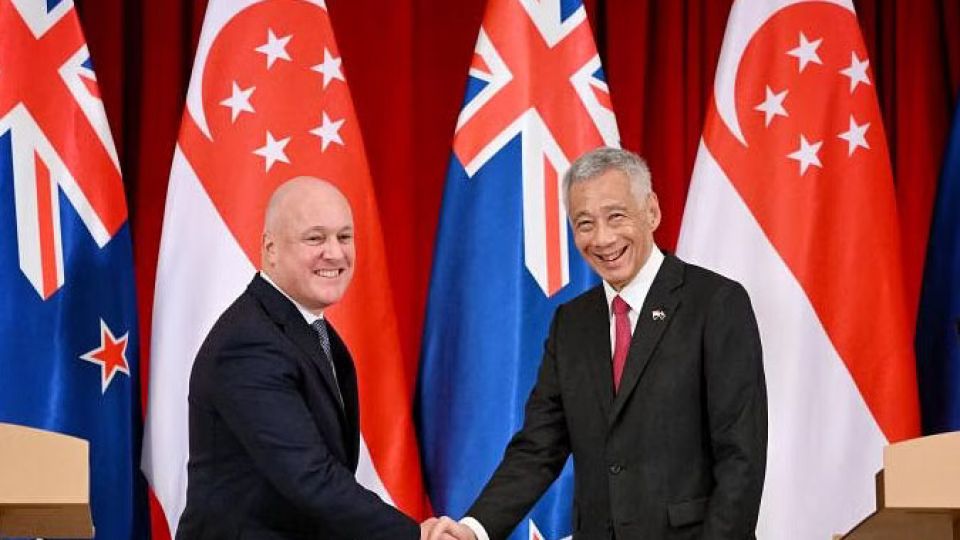April 16, 2024
SINGAPORE – Small countries cannot resolve conflicts such as those in the Middle East, but can try to calm things down and encourage dialogue in the region, Prime Minister Lee Hsien Loong said on April 15.
He was speaking at a joint media conference at the Istana with his New Zealand counterpart Christopher Luxon, where he was asked about the role small nations like Singapore and New Zealand can play amid escalating global tensions.
Asked if he thought a global war was on the cards, PM Lee said: “I do not think we are close to a world war; I think it is a very troubled world, and in particular, it is a very troubled Middle East.”
While nothing is going to solve problems in the Middle East in the foreseeable future, small countries still have a role to play, he added.
“You can try and calm things down, and you can get people back on track about talking about peace, maybe. And even that is going to be very hard given what has happened on Oct 7, and post-Oct 7,” said PM Lee.
“But if you do not try to do that, then you are saying the only way is the way of the sword, and I think that is going to lead to calamity for everybody,” he added.
Mr Luxon, who arrived in Singapore on April 14 for a three-day official visit, noted that New Zealand and Singapore have common interests, and that both are aligned on the rules of international and humanitarian law.
“What we want to continue to say is that we really want people to exercise restraint… and as (PM Lee) says, get into a negotiation and a conversation that ultimately leads to a Middle East peace process and a two-state solution,” he said.
It is his first trip to Singapore as prime minister since he was elected in October 2023.
PM Lee also stressed the importance of small countries taking a stand and explaining what they consider right and wrong, as well as what they think will be helpful towards developing a global consensus.
The leaders’ comments follow Iran’s attack on Israeli territory late on April 13, when it launched a swarm of explosive drones and missiles in retaliation against what it called an Israeli strike on April 1.
The strike on its Damascus consulate, which Israel has neither confirmed nor denied responsibility for, killed 12 people, including two senior commanders of the Revolutionary Guards.
The Ministry of Foreign Affairs said on April 14 that Singapore strongly condemned Iran’s attack on Israel.
Asked about how small countries like Singapore and New Zealand can respond in an era of increasing deglobalisation, PM Lee said Singapore cannot afford to deglobalise and has to trade and find partners, including New Zealand.
“If Singapore has to make all the chips for ourselves, we will never make chips,” said PM Lee. If New Zealand has to eat all the food which it produces, it will not make a living either,” he said, to which Mr Luxon quipped: “We’d be very large.”
On April 15, both leaders announced that Singapore and New Zealand would start negotiations on a trade agreement on essential supplies, aimed at minimising disruptions during crises.
This is part of an expansion to the Enhanced Partnership between both countries that will focus on supply chains and connectivity.
Before the latest pillar, the partnership agreement had five pillars covering areas including trade, climate change, security, technology and people-to-people ties. The partnership was signed in 2019 by PM Lee and then Prime Minister Jacinda Ardern.
PM Lee said on April 15 that as small states, Singapore and New Zealand share a deep understanding of the importance of maintaining supply chain connectivity, especially in times of crisis.
He recalled how the two countries supported each other in the early months of the Covid-19 pandemic when borders were closed and supply chains disrupted. During that time, Singapore and New Zealand formed an air freight partnership that brought 100 tonnes of food from New Zealand to Singapore, and essential medical supplies from Singapore to New Zealand.
The new pillar on supply chains and connectivity reflects the countries’ continuing commitment to keep supply chains connected in a volatile global environment, said PM Lee.
Mr Luxon added: “Supply chain resilience is not just about times of crisis, and there are opportunities to expand commercial partnerships between Singaporean and New Zealand businesses, and to provide investment through enhanced connectivity.”
The two countries also signed agreements on electronic invoicing, trading essential supplies and facilitating safe and efficient trade.
PM Lee said that there is more the two countries can do together and that he and Mr Luxon agreed it was timely to elevate the Enhanced Partnership next year, which marks the 60th anniversary of the countries’ diplomatic relations.
“We will explore future-oriented initiatives in areas such as sustainable aviation, the green economy and supply chains,” he added.
PM Lee said he welcomed efforts by Mr Luxon and his government to deepen New Zealand’s engagement with South-east Asia.
“New Zealand can contribute much to Asean’s integration in the digital and green economies,” he added, noting that New Zealand and Asean commemorate 50 years of dialogue relations in 2025.
Earlier on April 15, Mr Luxon had an orchid named after him at the Singapore Botanic Gardens.
Upon his arrival at the Istana, he received an official welcome before calling on President Tharman Shanmugaratnam and PM Lee.
PM Lee then hosted his counterpart to an official lunch, where the beef and wine came from New Zealand.


